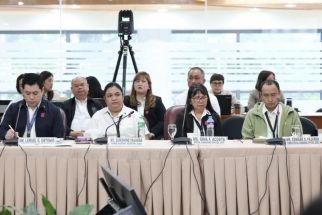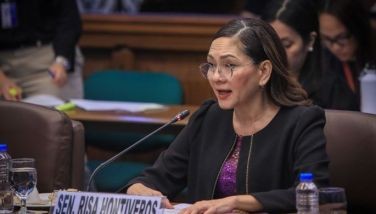MRT 3-LRT bottleneck: Negotiated contract or public bidding?
October 25, 2002 | 12:00am
So, where exactly is the bottleneck?
Much has been said about the benefits the public at large and the government will reap once the perpendicular Metrorail Transit 3 and the Light Rail Transit (LRT) lines are interconnected through a 5.12-kilometer extension of the MRT-3.
The two-year delay in implementing this MRT-3 extension and connection to the LRT was the subject of a recent inquiry by the House committee on transportation and communications.
In a privileged speech on Oct. 9, Caloocan Rep. Edgar Erice attributed the delay in the project’s implementation to in-fighting between Presidential Adviser for Special Projects Gloria Tan-Climaco and Department of Transportation and Communications (DOTC) Secretary Leandro Mendoza.
Climaco said in a statement that she is not the reason for the delay in the MRT 3-LRT interconnection project, despite statements from Representatives Jacinto Paras, Prospero Pichay and Erice attributing the delay to her.
She also said that the testimonies she and Mendoza made during the Oct. 23 committee hearing, however, "revealed that it was Mendoza’s function to implement, while it was Climaco’s function to advise the President."
As proof of cooperation between them, Climaco said, "negotiations with the Sobrepeña group, which has a build-lease-transfer (BLT) arrangement with the government for MRT 3, were led by the DOTC through Transport Undersecretary Jose Cortes Jr.," whom she assisted at the time.
Climaco also said "the proposal for the interconnection has been in the pipeline since 1997. Despite this, no substantial progress was made between September 2000 and October 2001."
The MRT 3-LRT interconnection was designed as a strategic project and assigned by President Arroyo to Climaco on Aug. 6, 2002, the presidential adviser said.
In the past two and a half months, Climaco added, she and Cortes "were able to negotiate for a decrease in the project cost by $22 million – from $213 million to $191 million – and reduce the return-on-equity (cost) from 15 percent to 13 percent, among others."
Climaco also said "the major pending issue is whether it would be legal for DOTC to undertake the project on a negotiated basis through a supplemental agreement to the BLT agreement between DOTC and the Sobrepeña group, or through public bidding."
She added that Mendoza "initially stated that he intended to implement the proposed project through a (negotiated) supplemental agreement."
Nueva Vizcaya Rep. Carlos Padilla, however, said Mendoza should consider that the major economic agencies of the government, such as the National Economic and Development Authority (NEDA) and the Department of Finance are already of the opinion that the project (may) be undertaken through public bidding to obtain the best possible price for the government.
Quirino Rep. Junie Cua said Climaco is merely performing the duties assigned to her by Mrs. Arroyo, so she has no choice in the matter.
Parañaque Rep. Eduardo Zialcita, for his part, expressed disappointment with NEDA and suggested that the Department of Justice and the Office of the President be made part of NEDA so that all legal concerns and all legal opinions rendered will have been made prior to approval of future projects.
The MRT 3-LRT interconnection project had been approved on first-pass by NEDA last July.
Much has been said about the benefits the public at large and the government will reap once the perpendicular Metrorail Transit 3 and the Light Rail Transit (LRT) lines are interconnected through a 5.12-kilometer extension of the MRT-3.
The two-year delay in implementing this MRT-3 extension and connection to the LRT was the subject of a recent inquiry by the House committee on transportation and communications.
In a privileged speech on Oct. 9, Caloocan Rep. Edgar Erice attributed the delay in the project’s implementation to in-fighting between Presidential Adviser for Special Projects Gloria Tan-Climaco and Department of Transportation and Communications (DOTC) Secretary Leandro Mendoza.
Climaco said in a statement that she is not the reason for the delay in the MRT 3-LRT interconnection project, despite statements from Representatives Jacinto Paras, Prospero Pichay and Erice attributing the delay to her.
She also said that the testimonies she and Mendoza made during the Oct. 23 committee hearing, however, "revealed that it was Mendoza’s function to implement, while it was Climaco’s function to advise the President."
As proof of cooperation between them, Climaco said, "negotiations with the Sobrepeña group, which has a build-lease-transfer (BLT) arrangement with the government for MRT 3, were led by the DOTC through Transport Undersecretary Jose Cortes Jr.," whom she assisted at the time.
Climaco also said "the proposal for the interconnection has been in the pipeline since 1997. Despite this, no substantial progress was made between September 2000 and October 2001."
The MRT 3-LRT interconnection was designed as a strategic project and assigned by President Arroyo to Climaco on Aug. 6, 2002, the presidential adviser said.
In the past two and a half months, Climaco added, she and Cortes "were able to negotiate for a decrease in the project cost by $22 million – from $213 million to $191 million – and reduce the return-on-equity (cost) from 15 percent to 13 percent, among others."
Climaco also said "the major pending issue is whether it would be legal for DOTC to undertake the project on a negotiated basis through a supplemental agreement to the BLT agreement between DOTC and the Sobrepeña group, or through public bidding."
She added that Mendoza "initially stated that he intended to implement the proposed project through a (negotiated) supplemental agreement."
Nueva Vizcaya Rep. Carlos Padilla, however, said Mendoza should consider that the major economic agencies of the government, such as the National Economic and Development Authority (NEDA) and the Department of Finance are already of the opinion that the project (may) be undertaken through public bidding to obtain the best possible price for the government.
Quirino Rep. Junie Cua said Climaco is merely performing the duties assigned to her by Mrs. Arroyo, so she has no choice in the matter.
Parañaque Rep. Eduardo Zialcita, for his part, expressed disappointment with NEDA and suggested that the Department of Justice and the Office of the President be made part of NEDA so that all legal concerns and all legal opinions rendered will have been made prior to approval of future projects.
The MRT 3-LRT interconnection project had been approved on first-pass by NEDA last July.
BrandSpace Articles
<
>
- Latest
- Trending
Trending
Latest
Trending
Latest
Recommended
November 26, 2024 - 12:00am































